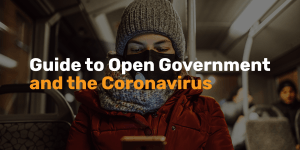Reviewing OGP Processes for its Tenth Anniversary
The 10th anniversary of the Open Government PartnershipThe Open Government Partnership (OGP) is a multi-stakeholder initiative focused on improving government transparency, ensuring opportunities for citizen participation in public matters, and strengthen... More (OGP) offers an exciting opportunity to gather feedback and propose ambitious changes to safeguard open government values and accomplish two main goals set out in OGP’s Three-Year Implementation Plan (3YP): more ambitionAccording to OGP’s Articles of Governance, OGP commitments should “stretch government practice beyond its current baseline with respect to key areas of open government.” Ambition captures the po... and better implemented commitments.
With this in mind, the OGP Criteria & Standards (C&S) Subcommittee has been exploring ways to
- Streamline the Participation and Co-Creation Standards, and
- Introduce some flexibility in the action planAction plans are at the core of a government’s participation in OGP. They are the product of a co-creation process in which government and civil society jointly develop commitments to open governmen... cycle.
This stems from surveys of the open government community, ongoing discussions with OGP staff, and consultations with the Independent Reporting Mechanism (IRM)The Independent Reporting Mechanism (IRM) is OGP’s accountability arm and the main means of tracking progress in participating countries. The IRM provides independent, evidence-based, and objective ..., OGP Local and Multi-Donor Trust FundWith the support of development partners and working together with the World Bank, OGP established the Multi-Donor Trust Fund (MDTF) to support World Bank client countries and local entities that part... partners. The OGP Steering CommitteeThe Steering Committee is OGP’s executive decision-making body. Its role is to develop, promote and safeguard OGP’s values, principles and interests; establish OGP’s core ideas, policies, and ru... also discussed these ideas in its recent virtual meeting in July 2020 and, concurring with the feedback gathered from global stakeholders, the Steering Committee supported the general idea of simplified standards and enhanced flexibility in the action plan cycle.
Important contributions from both the global community and the OGP Steering Committee emphasized clear rules on decision-making processes for longer action plans, protecting and enhancing the space for civil society engagement during action plan implementation, and maintaining the pace of co-creation without the odd and even-year cohorts that are now in place.
What is next?
During the next few months, the C&S Subcommittee and the OGP Support UnitThe OGP Support Unit is a small, permanent group of staff that work closely with the Steering Committee and the Independent Reporting Mechanism to advance the goals of the Open Government Partnership.... will develop concrete proposals on how this could look like in practice. We will then consult the global community in late 2020 or early 2021. This input will inform final proposals for Steering Committee approval in the first half of 2021, and develop enhanced guidance materials to be ready to roll out changes in 2022.
What we are exploring
As Co-ChairsThe leadership of the Steering Committee is made up of four co-chairs who provide strategic guidance and support to advance OGP’s overarching priorities. Co-Chairs serve two-year terms beginning on ... of the C&S Subcommittee, we are thrilled to share more details about our ongoing discussions and invite the OGP community to join us in our efforts to make OGP more ambitious and effective.
Reviewing the Participation and Co-Creation StandardsCollaboration between government, civil society and other stakeholders is at the heart of the OGP process. The Participation and Co-Creation Standards are intended to support this collaboration throug...
The OGP Participation and Co-Creation Standards were approved in 2016 to make existing requirements more specific and easier to implement. They also introduce a focus on the quality of the consultation by providing guidance on the ongoing collaboration between government and civil society in the three phases of the OGP national action plan cycle: development, implementation and monitoring.
After four years of using and assessing the standards, we’ve identified clear areas for improvement:
- The standards are too numerous, complex and confusing: currently there are 60 standards organized into three categories: i) basic vs advanced; ii) phase of the action plan cycle; and iii) and the type of the standard.
- Some standards are redundant or overlapping: The standards include several mentions of certain parts of the OGP process and requirements such as the organization and tasks of Multi-Stakeholder Forums (MSF) that are repeated or organized in a way that could create confusion.
- The standards rely on external frameworks: currently the standards build on the International Association for Public ParticipationGiving citizens opportunities to provide input into government decision-making leads to more effective governance, improved public service delivery, and more equitable outcomes. Technical specificatio... (IAP2) values, and countries are assessed on the level of the IAP2 Spectrum of Public Participation that they achieve while creating and implementing an action plan. This additional third-party point of reference can be confusing to OGP stakeholders.
Building on the initial feedback received from the OGP community, we will work with OGP on developing a model that:
- Simplifies and streamlines the standards: Reducing the number of standards and clearly differentiating between minimum requirementsAll OGP participating countries are expected to adhere to the Participation and Co-Creation Standards. Each Standard includes clear and measurable minimum requirements that all OGP participating count... (required for all OGP countries to achieve) and expected standards (encouraged for all OGP members to reach) will enable greater accountability, incentivize greater ambition, and allow for greater flexibility according to specific contexts.
- Provides additional tools to stakeholders: OGP would provide more detailed guidance on the minimum requirements that shall be assessed by the IRM. Additional guidance for achieving more ambitious, but optional, co-creation practices shall also be offered.
- Eliminates redundancies, ambiguity and the use of external proxies: The new standards would be streamlined to eliminate all redundancies and stop using external proxies such as the IAP2 spectrum.
- Harmonizes with other proposed rule changes: For example, if longer action plans are to be considered, the requirements for civil society engagement during implementation would have to be enhanced, especially since the current standards provide higher incentives for engagement during co-creation.
Adding Flexibility to the Action Plan Process
While OGP has grown in size and complexity since its establishment ten years ago, the action plan model has remained largely unchanged. Over the past six years, several consultation processes within the Partnership have revealed a desire for greater flexibility in the length, delivery, and implementation of the action plan cycle. These initial ideas include:
- Length of the action plan: Under a new model, countries could choose between a two or four-year action plan.
- Delivery of action plans: Rather than a strict deadline, a flexible model could allow for countries to select over a few implementation periods that better align with their administrative and political cycles.
- Co-creation period: Countries could select to either co-create their next action plan during the final part of the current plan implementation, or have a combined learning and co-creation period of up to one year.
While the various ideas could result in a complicated combination of options, we hope to propose a model of flexibility in action planning that reflects the sophistication of our partnership while remaining simple.
We are excited to be leading this review process and we invite you to both take part in the coming global consultations and to reach out to us with your inputs and suggestions.
No comments yet
Related Content

Taking the OGP Co-Creation Process Online
Find practical tips, a curated list of online tools and platforms, and country examples to help take your OGP co-creation process online.
OGP Participation & Co-Creation Standards (2017)
Civic participation is a core component of open government, and an essential element of the national OGP cycle. The OGP Articles of Governance state that ‘OGP participants commit to developing…

A Guide to Open Government and the Coronavirus
This guide is a one-stop shop for the best current resources on how open government projects and approaches can support tackling the pandemic.


Leave a Reply